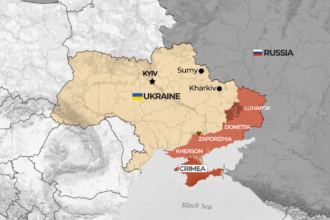Belarusian authorities have confirmed that a planned drone attack on several strategic sites within the country was successfully thwarted by the nation’s intelligence and security services. The attempted assault, which was reportedly aimed at critical infrastructure facilities, marks one of the most serious security threats Belarus has faced in recent months.
Officials from the Belarusian State Security Committee (KGB) have stated that the threat was neutralized before any damage could occur. The incident highlights the growing use of unmanned aerial systems (UAS) in hybrid warfare and raises questions about regional security in Eastern Europe amid escalating tensions between Belarus, Ukraine, NATO, and Russia.
The Attempted Attack
According to an official statement from Belarusian intelligence services, the intercepted drone operation involved multiple aerial vehicles designed to target high-value assets, including energy infrastructure, military storage sites, and communication hubs. The drones were reportedly launched from outside Belarusian borders, although authorities have not confirmed which country was responsible.
Surveillance systems first detected the aerial objects as they crossed into Belarusian airspace late at night. Electronic warfare units were activated to jam and disable the drones, while rapid response teams secured the facilities that were potentially under threat.
No casualties or physical damage have been reported, and security forces are now investigating the origins of the drones, their launch mechanisms, and potential foreign involvement.
Intelligence and Countermeasure Response
Belarusian officials have praised the quick reaction of their security and defense forces. According to state media, the drones were intercepted through a combination of electronic countermeasures, radar surveillance, and coordinated intelligence sharing between domestic and military agencies.
Yury Karayev, a senior official in Belarus’s national security council, said in a press briefing that the attempt was “a sophisticated, coordinated operation” and “a clear act of sabotage aimed at destabilizing national infrastructure.” He added that preliminary analysis suggests the involvement of foreign actors seeking to undermine Belarus’s internal stability and strategic autonomy.
While officials have declined to publicly name a suspected perpetrator, analysts point to increasing drone activity in Eastern Europe, particularly along the borders with NATO member states and Ukraine, as part of broader asymmetric tactics being deployed in the region.
A Regional Context of Rising Tensions
The incident occurs at a time of heightened geopolitical strain. Since Russia’s full-scale invasion of Ukraine in 2022, Belarus has been under close international scrutiny for its close alignment with Moscow and its role in allowing Russian troops to operate within its borders.
At the same time, Belarus has accused Western nations of attempting to destabilize its government through sanctions, intelligence operations, and support for opposition figures.
Drone warfare has become a defining feature of modern conflict in Eastern Europe. Both state and non-state actors increasingly rely on drones for surveillance, sabotage, and psychological operations. The low cost and high impact potential of drones make them an appealing option for those seeking to carry out attacks without direct confrontation.
International Reactions and Security Implications
There has been no immediate reaction from neighboring countries or international organizations, though diplomatic observers anticipate that Belarus may raise the issue at the United Nations or through bilateral security channels.
Security experts warn that the attempted drone strike could be a precursor to more aggressive tactics in the coming months, especially as military and political alliances shift throughout the region.
If the drones are linked to a foreign government or paramilitary group, Belarus may seek justification for further tightening internal controls or increasing military cooperation with Russia.
The successful interception of a drone attack on Belarusian strategic infrastructure underscores both the increasing vulnerability of nations to new forms of hybrid warfare and the rising stakes in regional power dynamics. As Belarus investigates the origins and intent behind the attempted strike, the broader implications for security, diplomacy, and military readiness across Eastern Europe remain uncertain.
Whether this event marks an isolated act or the beginning of a more sustained campaign, it is clear that drone threats are becoming a central concern for national defense — and Belarus is treating the matter with the seriousness it demands.










